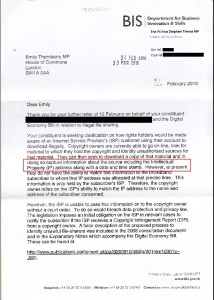The Petition: This petition has been set up in response to the Government’s proposal to cut off internet access to those who are caught illegally downloading copyrighted files. We think this has one fundamental flaw, as illegal filesharers will simply hack into other peoples WiFi networks to do their dirty work. This will result in … Continue reading “The Digital Economy Bill”
The Petition:
This petition has been set up in response to the Government’s proposal to cut off internet access to those who are caught illegally downloading copyrighted files. We think this has one fundamental flaw, as illegal filesharers will simply hack into other peoples WiFi networks to do their dirty work. This will result in innocent people being disconnected from the internet. What’s more, such a punishment should be dealt with in the proper way, in a court of law. This guilty until proven innocent approach violates basic human rights.
Sign the Petition
It’s a simple question:
Does this Bill support the little guy?
If it does, then by all means, it should be supported. If it does not, then it is unsuitable and should be returned.
The little guy is the small business creating content or software. Nothing I have read in the Digital Economy Bill protects or assists the small business content creator. Everything I have read goes into protecting the interests of large content aggregation companies.
The current regime, of which this Bill will enhance and extend, proscribes “unlimited” fines and jail terms for filesharing. These fines do not go to the copyright owners but instead go to further prop up an industry which is finding itself undermined by the copyright owners and creators themselves. Small businesses are currently giving their content away in order to be noticed – this Bill is not concerned with small businesses, it is not concerned with enterprise.
One thing is definite however – this Bill has empassioned professionals within the industry to speak out against the Bill in its current form – most visibly Stephen Fry but also Mark Harding, Intellectual Property Director for KPMG and a plethora of other names, big and small.
Personally I think the focus on policing rather than enterprise is utterly abhorrent, the measures rushed and ultimately damaging to the UK economy. I also refute the concept that small businesses are truly suffering ‘because of filesharing’ and more than ‘home taping’ hurt them in the 70s.
We break UK copyright law every time we rip a CD to our computers and then again when we transfer to our iPods. Our copyright laws are woefully out of date and this grants sweeping powers for copyright infringement whether the individual concerned us aware of the infringement or not. Who is to say that you have permission to copy the text here for any purposes? But your computer has already cached my content which is, technically, a breach of my copyright. And if my web site started to play copyrighted music? You are now guilty of that as well.
I am not defending anyone’s right to steal anyone else’s copyright whether that is music, software, video or text. Nor am I saying that this is an area to be ignored in law. The fact remains that with access to a global market and digital duplication being pristine, the cost of reproduction of content is being driven towards zero. This means that a proportionally higher amount of the revenue for digital content should be available to the content creator. This currently is not happening and this Bill does nothing to redress this.
I am, however, saying that this Bill, in it’s current form, is not the correct solution. The provisions are ill-thought-out, the resolutions rushed.
